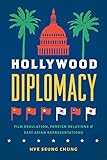Hollywood Diplomacy : Film Regulation, Foreign Relations, and East Asian Representations / Hye Seung Chung.
Material type: TextPublisher: New Brunswick, NJ : Rutgers University Press, [2020]Copyright date: ©2020Description: 1 online resource (227 p.) : 25 B-W photographsContent type:
TextPublisher: New Brunswick, NJ : Rutgers University Press, [2020]Copyright date: ©2020Description: 1 online resource (227 p.) : 25 B-W photographsContent type: - 9781978801561
- 9781978801592
- 791.43/65295 23
- PN1995.9.E23 C48 2020
- PN1995.9.E23 C48 2020eb
- online - DeGruyter
- Issued also in print.
| Item type | Current library | Call number | URL | Status | Notes | Barcode | |
|---|---|---|---|---|---|---|---|
 eBook
eBook
|
Biblioteca "Angelicum" Pont. Univ. S.Tommaso d'Aquino Nuvola online | online - DeGruyter (Browse shelf(Opens below)) | Online access | Not for loan (Accesso limitato) | Accesso per gli utenti autorizzati / Access for authorized users | (dgr)9781978801592 |
Browsing Biblioteca "Angelicum" Pont. Univ. S.Tommaso d'Aquino shelves, Shelving location: Nuvola online Close shelf browser (Hides shelf browser)

|

|

|

|

|

|

|
||
| online - DeGruyter The Boxing Film : A Cultural and Transmedia History / | online - DeGruyter Anthony Cerami : A Life in Translational Medicine / | online - DeGruyter Inside Academia : Professors, Politics, and Policies / | online - DeGruyter Hollywood Diplomacy : Film Regulation, Foreign Relations, and East Asian Representations / | online - DeGruyter Planet Auschwitz : Holocaust Representation in Science Fiction and Horror Film and Television / | online - DeGruyter It Will Yet Be Heard : A Polish Rabbi's Witness of the Shoah and Survival / | online - DeGruyter Honor and the Political Economy of Marriage : Violence against Women in the Kurdistan Region of Iraq / |
Frontmatter -- Contents -- Introduction -- Part I. Diplomatic Representations in Classical Hollywood -- 1. Censorship as Cultural Resistance: The Chinese Government's "Uplift" of National Images in 1930s Hollywood -- 2. Justified Patricide and (Im)Properly Directed Hatred: Regulating the Representations of Chinese and Japanese in Doolittle Raid Films -- 3. Beyond the Propaganda Model: The Pentagon as a Technical Advisor for Brainwashing Films of the Cold War Era -- Part II. The War on Terror, Contemporary Hollywood, and Its Global Discontents -- 4. From Die Another Day to "Another Day": The Anti-007 Movement, Pan-Asian Nationalism, and Protests as Censorship -- 5. The Interview as a Twenty-First- Century Great Dictator? Rethinking Film Regulation and Foreign Relations through the Sony Crisis -- Conclusion: Chinese Censors Return to Hollywood -- Appendix -- Acknowledgments -- Notes -- Index -- About the Author
restricted access online access with authorization star
http://purl.org/coar/access_right/c_16ec
Hollywood Diplomacy contends that, rather than simply reflect the West's cultural fantasies of an imagined "Orient," images of Chinese, Japanese, and Korean ethnicities have long been contested sites where the commercial interests of Hollywood studios and the political mandates of U.S. foreign policy collide, compete against one another, and often become compromised in the process. While tracing both Hollywood's internal foreign relations protocols-from the "Open Door" policy of the silent era to the "National Feelings" provision of the Production Code-and external regulatory interventions by the Chinese government, the U.S. State Department, the Office of War Information, and the Department of Defense, Hye Seung Chung reevaluates such American classics as Shanghai Express and The Great Dictator and applies historical insights to the controversies surrounding contemporary productions including Die Another Day and The Interview. This richly detailed book redefines the concept of "creative freedom" in the context of commerce: shifting focus away from the artistic entitlement to offend foreign audiences toward the opportunity to build new, better relationships with partners around the world through diplomatic representations of race, ethnicity, and nationality.
Issued also in print.
Mode of access: Internet via World Wide Web.
In English.
Description based on online resource; title from PDF title page (publisher's Web site, viewed 26. Mai 2021)


